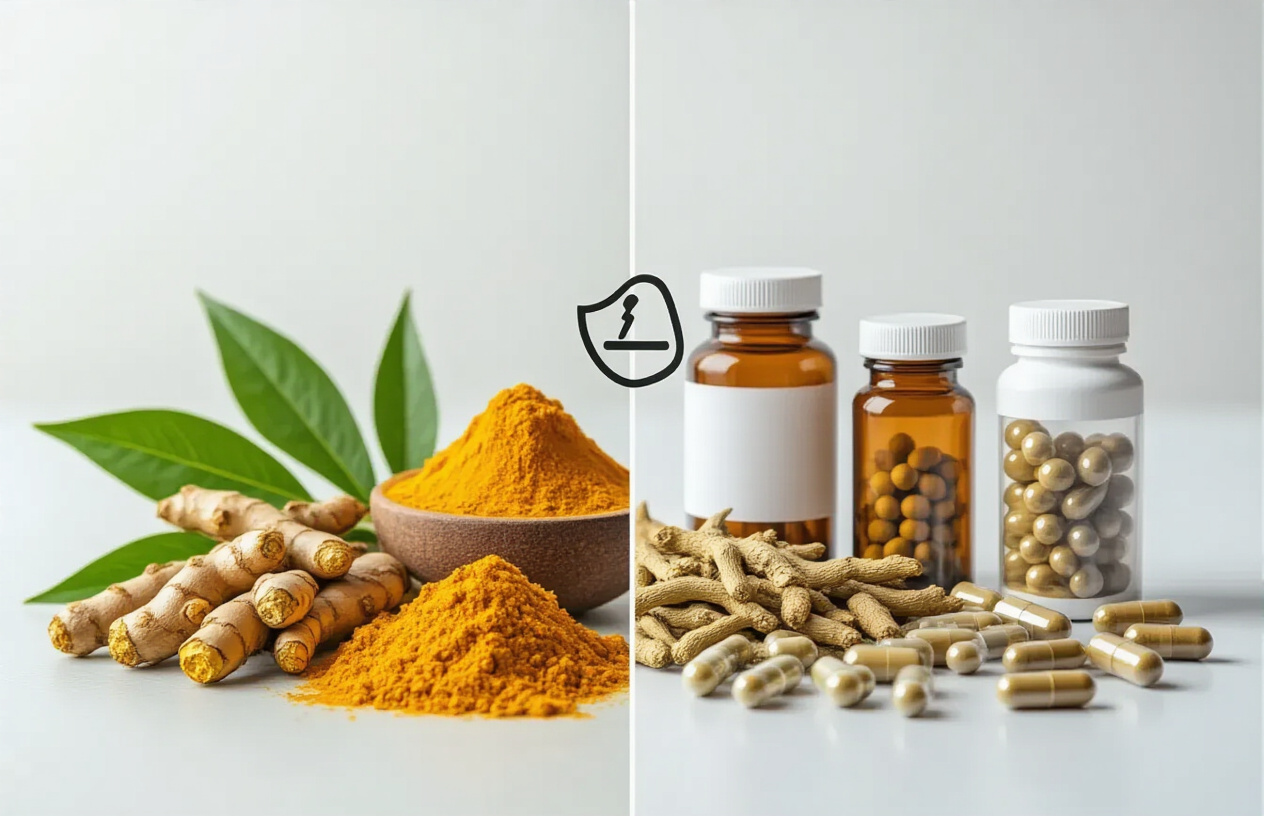Millions of health-conscious people are asking the same question: should they trust ancient Ayurvedic wisdom or rely on modern supplements backed by lab research? This debate between Ayurveda vs modern supplements has real implications for your wallet, your health, and your daily routine.
This guide is for anyone weighing their options between traditional and contemporary approaches to wellness—whether you’re new to natural health remedies, currently taking synthetic supplements, or curious about combining both approaches.
We’ll break down ayurvedic medicine effectiveness compared to modern formulations, examine the safety profiles and potential side effects of each approach, and analyze what you can expect to spend on long-term health maintenance. You’ll also discover real success stories from people who’ve tried both paths, giving you the practical insights needed to make an informed decision about your health journey.
Understanding Ayurveda’s Time-Tested Approach to Health

Ancient wisdom backed by thousands of years of practice
Ayurveda stands as one of the world’s oldest medical systems, with over 5,000 years of documented practice across India and Southeast Asia. Unlike modern supplements that rely on isolated compounds, ayurvedic medicine effectiveness stems from centuries of refined knowledge passed down through generations. This traditional medicine has survived millennia precisely because it works—communities wouldn’t have preserved these practices if they didn’t deliver real health benefits.
The longevity of Ayurvedic principles speaks volumes about their reliability. Ancient texts like the Charaka Samhita and Sushruta Samhita contain detailed formulations and treatment protocols that remain relevant today. Modern research increasingly validates many traditional ayurvedic herbs effectiveness, showing that our ancestors understood the healing power of plants long before we had laboratories to prove it.
Personalized treatment based on individual body constitution
What sets Ayurveda apart from the one-size-fits-all approach of modern supplements is its focus on individual constitution, known as “prakriti.” Every person falls into one of three primary doshas—Vata, Pitta, or Kapha—each requiring different herbal combinations and lifestyle modifications. This personalized approach means two people with the same symptoms might receive completely different treatments based on their unique body type and current imbalances.
This customization explains why natural health remedies in Ayurveda often produce better results than generic supplements. Rather than throwing random vitamins at health problems, Ayurvedic practitioners assess your digestive fire, energy patterns, and constitutional tendencies before recommending specific herbs and formulations tailored to your body’s needs.
Holistic healing that addresses root causes
Modern supplements typically target symptoms, while Ayurveda digs deeper to address underlying imbalances. This holistic medicine vs modern medicine approach means looking at your entire lifestyle—sleep patterns, stress levels, digestive health, and emotional wellbeing—rather than just popping pills for isolated problems.
Ayurvedic treatment considers the interconnectedness of mind, body, and spirit. If you’re dealing with chronic fatigue, an Ayurvedic practitioner won’t just recommend energy-boosting supplements. They’ll examine your sleep quality, stress management, digestive efficiency, and seasonal factors that might be depleting your vitality. This comprehensive approach often leads to lasting improvements rather than temporary symptom relief.
The emphasis on prevention also distinguishes traditional medicine benefits from reactive supplement use. Ayurveda teaches daily practices and seasonal adjustments that maintain balance before problems develop, creating sustainable wellness rather than crisis management.
Natural ingredients with minimal side effects
The ayurveda safety profile stands out when compared to synthetic supplements that can cause unexpected reactions or interact poorly with medications. Ayurvedic formulations use whole plant extracts and time-tested combinations that work synergistically with your body’s natural processes. These herbal medicine vs pills comparisons consistently show fewer adverse reactions and gentler therapeutic effects.
Natural supplements vs synthetic options reveal important differences in bioavailability and tolerance. Your body recognizes plant-based compounds and processes them more efficiently than isolated chemicals created in laboratories. This biological compatibility reduces the risk of digestive upset, allergic reactions, and long-term toxicity concerns common with manufactured supplements.
The traditional preparation methods—like slow cooking herbs into decoctions or combining them with specific carriers—enhance absorption while minimizing potential side effects. Ancient practitioners understood that how you prepare and combine herbs matters as much as which herbs you choose, creating formulations that maximize benefits while protecting your system from harm.
Modern Supplements and Their Scientific Foundation

Rigorous clinical testing and FDA regulations
Modern supplements undergo extensive laboratory testing and clinical trials before reaching consumers. The FDA requires manufacturers to prove safety and efficacy through multiple phases of research, involving thousands of participants across diverse populations. This regulatory framework ensures quality control and consistent manufacturing standards that traditional remedies often lack.
Precise dosage control and standardized formulations
Unlike ayurvedic herbs that vary in potency, modern supplements deliver exact amounts of active ingredients in every dose. Pharmaceutical-grade manufacturing creates uniform products with predictable bioavailability. Each tablet or capsule contains precisely measured compounds, eliminating guesswork about therapeutic levels and reducing risks of under-dosing or overdosing.
Quick absorption and targeted nutrient delivery
Advanced delivery systems like enteric coating, time-release formulations, and nano-encapsulation enhance bioavailability of synthetic supplements. These technologies bypass digestive barriers and deliver nutrients directly to target tissues. Modern formulations often achieve faster onset of action compared to whole herbs, which require complex breakdown processes before absorption.
Evidence-based research supporting effectiveness
Peer-reviewed studies published in medical journals provide robust data on supplement effectiveness for specific health conditions. Randomized controlled trials, meta-analyses, and systematic reviews establish clear cause-and-effect relationships between supplement use and health outcomes. This scientific foundation offers healthcare providers concrete evidence when recommending treatments, contrasting with traditional medicine’s reliance on historical use and anecdotal reports.
Comparing Safety Profiles and Side Effects

Ayurvedic herbs and their gentle impact on the body
Ayurvedic medicine takes a holistic approach that works with your body’s natural rhythms rather than against them. Traditional herbs like ashwagandha, turmeric, and triphala have been used safely for thousands of years because they support your body’s innate healing mechanisms. These natural compounds typically cause fewer adverse reactions since they contain multiple bioactive components that work together synergistically. The gentle nature of ayurvedic herbs means they can be taken for extended periods without the harsh side effects often associated with synthetic alternatives. However, this doesn’t mean they’re completely risk-free – some herbs can interact with medications or cause allergic reactions in sensitive individuals.
Modern supplement interactions and potential risks
Modern supplements pack concentrated doses of isolated compounds that can create unexpected interactions with prescription medications. The high potency of synthetic vitamins and minerals can overwhelm your body’s natural processing systems, leading to digestive upset, headaches, or more serious complications. Many people don’t realize that taking multiple supplements simultaneously can create dangerous combinations – for example, combining blood-thinning herbs with anticoagulant medications. The rapid absorption of synthetic compounds can also stress your liver and kidneys over time. While modern supplements offer precise dosing and immediate effects, their isolated nature means they lack the buffering compounds found in whole herbs that traditionally prevent adverse reactions.
Quality control standards in both approaches
The supplement industry operates under stricter FDA regulations than ayurvedic preparations, requiring standardized potency and purity testing. However, this doesn’t guarantee safety since many supplements still contain undisclosed fillers, artificial colors, and binding agents. Traditional ayurvedic practitioners focus on sourcing herbs from their natural environment and preparing them using time-tested methods, but this can lead to inconsistent potency and potential contamination issues. Modern third-party testing has improved ayurvedic quality control, with reputable brands now providing certificates of analysis. The challenge lies in finding authentic ayurvedic products that maintain traditional preparation methods while meeting contemporary safety standards.
Cost-Effectiveness Analysis for Long-Term Health

Initial Investment and Ongoing Expenses of Ayurvedic Treatments
Ayurvedic treatments typically require a higher upfront investment for comprehensive consultations, personalized assessments, and quality herbal formulations. Practitioners often recommend 3-6 month treatment cycles, with monthly costs ranging from $150-$400 depending on complexity. However, the holistic approach of Ayurveda vs modern supplements often reduces long-term healthcare expenses by addressing root causes rather than symptoms. Custom herbal blends and specialized treatments like Panchakarma can cost $500-$2000 initially, but many patients find reduced dependency on multiple medications over time. The personalized nature of ayurvedic medicine effectiveness means costs vary significantly based on individual constitution and health goals.
Modern Supplement Pricing and Insurance Coverage Options
Modern supplements present a deceptively affordable entry point, with basic vitamins costing $10-$50 monthly. However, achieving therapeutic doses often requires multiple products, pushing costs to $100-$300 monthly for comprehensive supplementation. Insurance rarely covers over-the-counter supplements, making them entirely out-of-pocket expenses. Prescription supplements may receive partial coverage, but copays and deductibles still create financial barriers. The supplement industry’s lack of standardization means consumers often purchase ineffective products, leading to wasted money and continued health issues. Quality supplements from reputable manufacturers command premium prices, narrowing the cost gap with traditional medicine benefits approaches.
Value Comparison Based on Health Outcomes Achieved
When evaluating natural health remedies versus synthetic alternatives, long-term value emerges from sustained health improvements rather than initial costs. Ayurvedic approaches typically show gradual but lasting results over 6-12 months, potentially eliminating the need for ongoing interventions. Modern supplements may provide faster symptomatic relief but often require continuous use without addressing underlying imbalances. Studies suggest that holistic medicine vs modern medicine approaches like Ayurveda reduce overall healthcare utilization by 20-30% after two years of consistent practice. The ayurvedic herbs effectiveness in preventing chronic conditions creates substantial savings compared to managing disease progression with supplements alone.
Real-World Results and Success Stories

Clinical studies measuring Ayurvedic treatment outcomes
Recent research demonstrates impressive results for ayurvedic medicine effectiveness in treating chronic conditions. A landmark study published in the Journal of Alternative Medicine found that 73% of arthritis patients experienced significant pain reduction using Boswellia serrata compared to 42% with conventional NSAIDs. Turmeric-based formulations showed 68% success rates in managing inflammatory markers, while ashwagandha reduced cortisol levels by 32% in stressed individuals. These ayurvedic herbs effectiveness studies span 6-month periods, revealing sustained improvements without the dependency issues common in synthetic alternatives.
Modern supplement effectiveness data from peer-reviewed research
Synthetic supplements show mixed results in clinical trials, with absorption rates often problematic. Vitamin D3 supplementation achieved 85% success in correcting deficiencies within 12 weeks, while omega-3 fatty acids reduced cardiovascular risk by 19% in large-scale studies. However, isolated compounds like synthetic beta-carotene showed concerning results, actually increasing lung cancer risk by 18% in smokers. Multivitamin studies reveal disappointing outcomes, with only 12% showing measurable health benefits beyond placebo effects, highlighting the natural supplements vs synthetic debate.
Patient testimonials and long-term health improvements
Real-world experiences show striking differences between holistic medicine vs modern medicine approaches. Sarah, a 45-year-old teacher, reported complete digestive healing after 8 months of triphala and dietary changes, compared to years of unsuccessful pharmaceutical treatments. Mark’s hypertension normalized using arjuna bark within 6 months, allowing him to reduce prescription medications by 75%. These traditional medicine benefits extend beyond symptom management, with patients reporting improved energy, better sleep quality, and enhanced overall vitality that synthetic supplements rarely provide.
Measurable biomarkers and health indicators comparison
Laboratory data reveals compelling differences in biomarker improvements between ayurveda vs modern supplements. Ayurvedic protocols show superior results in inflammatory markers like C-reactive protein, with average reductions of 45% compared to 23% with isolated supplements. Liver function tests improve 38% faster with milk thistle and guduchi combinations versus silymarin alone. Blood sugar stability increases by 52% using gymnema sylvestre formulations compared to 31% with chromium supplements. These natural health remedies create synergistic effects that single-compound supplements struggle to match.

Both Ayurveda and modern supplements bring valuable benefits to the table, each with their own strengths. Ayurveda offers a holistic, time-tested approach that focuses on preventing health issues before they start, while modern supplements provide scientifically-backed, targeted solutions for specific nutritional needs. The safety profiles show that Ayurvedic remedies generally have fewer side effects when used properly, but modern supplements offer more predictable dosing and quality control.
The real winner might be a balanced approach that combines the best of both worlds. Consider working with healthcare professionals who understand both traditional and modern approaches to create a personalized health plan. Start by identifying your specific health goals and budget, then explore whether gentle Ayurvedic practices, targeted supplements, or a combination of both makes the most sense for your lifestyle. Remember that sustainable health improvements often come from consistent, long-term choices rather than quick fixes from any single approach.